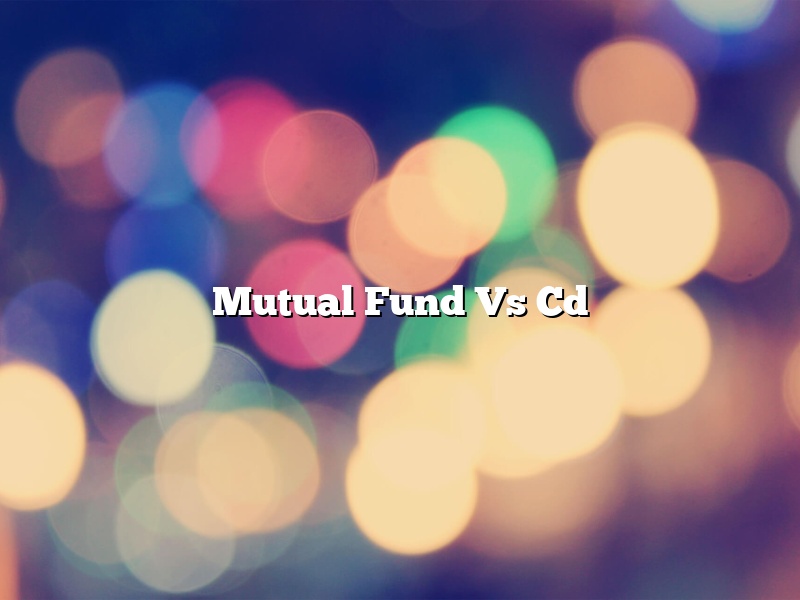When it comes to savings and investment options, there are many choices available to you. Two of the most common options are mutual funds and CDs. Both have their pros and cons, so it can be difficult to decide which is the best option for you. Here is a breakdown of the pros and cons of mutual funds and CDs so you can decide which is the best option for you.
Mutual Funds
The pros of mutual funds include:
1. Diversification: A mutual fund offers investors the opportunity to invest in a variety of stocks, which helps to minimize risk.
2. Professional Management: Mutual funds are managed by professional money managers, who have years of experience in the financial industry. This can help you to achieve your investment goals.
3. Liquidity: Mutual funds can be sold back to the mutual fund company at any time, which provides liquidity to investors.
4. Low Minimum Investment: Most mutual funds have a low minimum investment, which makes them accessible to a wider range of investors.
The cons of mutual funds include:
1. Fees: Mutual funds typically charge fees, which can eat into your profits.
2. Taxation: When you sell a mutual fund, you may have to pay capital gains tax.
3. Risk: Mutual funds are not without risk. The value of your investment could go down, which could result in losses.
Certificates of Deposit
The pros of CDs include:
1. Stability: CDs are FDIC insured, which means your money is safe.
2. Guaranteed Return: CDs offer a guaranteed return on your investment, which can be helpful if you are looking for a stable investment.
3. Low Minimum Investment: CDs typically have a low minimum investment, which makes them accessible to a wider range of investors.
The cons of CDs include:
1. Low Returns: CDs offer relatively low returns when compared to other investment options.
2. Limited Investment Options: CDs are not as diversified as mutual funds, so you may not be able to invest in the type of stock you are interested in.
3. Lock-In Period: CDs typically have a lock-in period, which means you cannot withdraw your money until the CD matures. This can be a disadvantage if you need access to your money quickly.
Contents [hide]
What is better a CD or mutual fund?
When it comes to saving money, there are a few different options to choose from. One option is a certificate of deposit (CD), which is a savings account that offers a fixed interest rate. Another option is a mutual fund, which is a collection of investments that are bought and sold together.
There are a few things to consider when deciding whether a CD or mutual fund is better for you. One thing to consider is how long you want to keep your money invested. With a CD, you have to keep your money invested for the entire term of the CD. With a mutual fund, you can sell your shares at any time.
Another thing to consider is how much risk you are willing to take. With a CD, your money is locked in and you cannot lose it, but you also cannot make any money on it if the interest rate goes up. With a mutual fund, there is always the risk that you could lose some or all of your money, but there is also the potential to make a lot of money if the fund does well.
Ultimately, the decision of whether a CD or mutual fund is better for you depends on your individual circumstances. If you are looking for a safe investment with no risk, a CD is a good option. If you are willing to take on a little more risk in order to potentially make more money, a mutual fund may be a better choice.
Can you lose money in a CD?
Can you lose money in a CD?
The answer to this question is yes, you can lose money in a CD. This is because a CD is a fixed-income investment, which means that the return you earn on your investment is fixed. If the interest rates on CD’s go down after you invest your money, you may not be able to earn as much on your CD as you would have if you had waited until the interest rates went up. This is why it is important to shop around for the best CD rates when you are looking to invest your money.
What is the disadvantage of money market mutual funds over CDs and savings accounts?
Money market mutual funds offer investors a way to earn a higher rate of return on their savings than what is available with a traditional savings account. However, there are a few key disadvantages that investors should be aware of before choosing a money market fund over a CD or a savings account.
The first disadvantage of money market mutual funds is that they typically have a higher fee than CDs or savings accounts. Money market funds typically charge a management fee and a fee for each transaction. This can quickly add up, especially if you are not careful about how often you are making deposits and withdrawals.
Another disadvantage of money market funds is that they are not FDIC insured. This means that if the fund suffers losses due to investments that go bad, the investors will not be able to recover their losses through the FDIC.
Finally, money market funds are not as liquid as CDs or savings accounts. This means that it can be more difficult to sell your shares in a money market fund than it is to sell a CD or withdraw money from a savings account. This can be a problem if you need to access your money quickly.
Is certificate of deposit a mutual fund?
Is certificate of deposit a mutual fund?
Certificate of deposit (CD) and mutual fund are both investment vehicles, but they are not the same. A CD is a type of savings account that offers a fixed interest rate and a fixed maturity date. A mutual fund is a collection of stocks, bonds, and other securities that investors can buy into.
The biggest difference between a CD and a mutual fund is that a mutual fund offers investors the opportunity to buy and sell shares at any time, while a CD does not. This means that mutual fund investors can take advantage of price changes and sell their shares when the market is up, while CD investors are stuck with the interest rate that was offered at the time of purchase.
Additionally, mutual funds typically have higher fees than CDs. This is because mutual funds have to do more work than CDs, such as buying and selling stocks and bonds. However, mutual funds offer investors the potential for higher returns than CDs.
In conclusion, a CD is not a mutual fund, and while CDs typically offer lower returns than mutual funds, they are also less risky.
How much does a 10000 CD make in a year?
10000 CDs is a lot of CDs. How much money can you make from 10000 CDs in a year?
At first glance, it would seem that the answer is not much. After all, how much can you really make from selling CDs? However, if you take a closer look, you will see that there are a few ways to make money from 10000 CDs.
Let’s start with the most obvious way: selling the CDs. If you sell each CD for $10, you will make $100,000. But, of course, you won’t be able to sell them all for that price. You may be able to sell them for $5 or $6 a piece, which will still give you a nice profit.
Another way to make money from your CDs is to give them away. You can give them away as promotional items to customers or to people who attend your events. You can also give them away as prizes to people who participate in your contests or sweepstakes.
Finally, you can also use your CDs to create a product that you can sell. For example, you can create a CD compilation of your music and sell it on your website. You can also create a CD of your music and sell it on Amazon or eBay.
In conclusion, there are a few ways to make money from 10000 CDs. You can sell them, give them away, or use them to create a product that you can sell. So, if you have 10000 CDs, don’t sell them all at once. Try to use them to make some extra money.
Are CDs worth it 2022?
Are CDs worth it in 2022?
This is a question that music lovers have been asking for years, and the answer is still not clear. While CDs may not be as popular as they once were, there are still some benefits to owning them.
The main benefit of a CD is its sound quality. Unlike digital downloads or streaming services, CDs offer a higher-quality listening experience. This is because they are not compressed, which can cause sound to be distorted.
Another benefit of CDs is that they are a physical format. This means that they are not as susceptible to data loss as digital files. If you lose your digital music collection, you may not be able to get it back, but if you lose your CD collection, you can always replace the discs.
However, there are some drawbacks to owning CDs. The first is that they are not as portable as digital files. If you want to listen to your music on the go, you need to bring your CDs with you, which can be inconvenient.
Another downside to CDs is that they are becoming less and less popular. This means that they are becoming harder and harder to find, and they are often more expensive than digital downloads or streaming services.
Ultimately, whether or not CDs are worth it in 2022 depends on your personal preferences. If you prioritize sound quality and you don’t mind the extra weight, then CDs are definitely worth it. But if you’re looking for convenience and affordability, then digital downloads and streaming services are a better option.
Are CDs a good investment in 2022?
Are CDs a good investment in 2022?
This is a question that is frequently asked by consumers, as they are looking for a safe and reliable investment option. In this article, we will explore the pros and cons of investing in CDs in 2022.
CDs, or certificates of deposit, are a type of savings account that offer a fixed interest rate for a predetermined time period. This makes them a relatively safe investment option, as the principal amount invested is guaranteed to be repaid at the end of the term.
One of the main advantages of CDs is that they offer a higher interest rate than traditional savings accounts. This can be beneficial for consumers who are looking to grow their savings over a period of time.
Another advantage of CDs is that they are FDIC-insured. This means that your principal amount is protected in the event that the financial institution goes bankrupt.
However, there are a few drawbacks to investing in CDs. First of all, the interest rate may not be as high as you would like, depending on the term length and the current interest rate environment.
Secondly, if you need to access your funds before the end of the term, you may be penalized with a early withdrawal fee. This can be a significant amount of money, particularly if the CD has a long term length.
Finally, if you decide to invest in a CD, make sure you are comfortable with the financial institution you are working with. Due to the current low interest rate environment, some banks may be offering very low interest rates on CDs.




